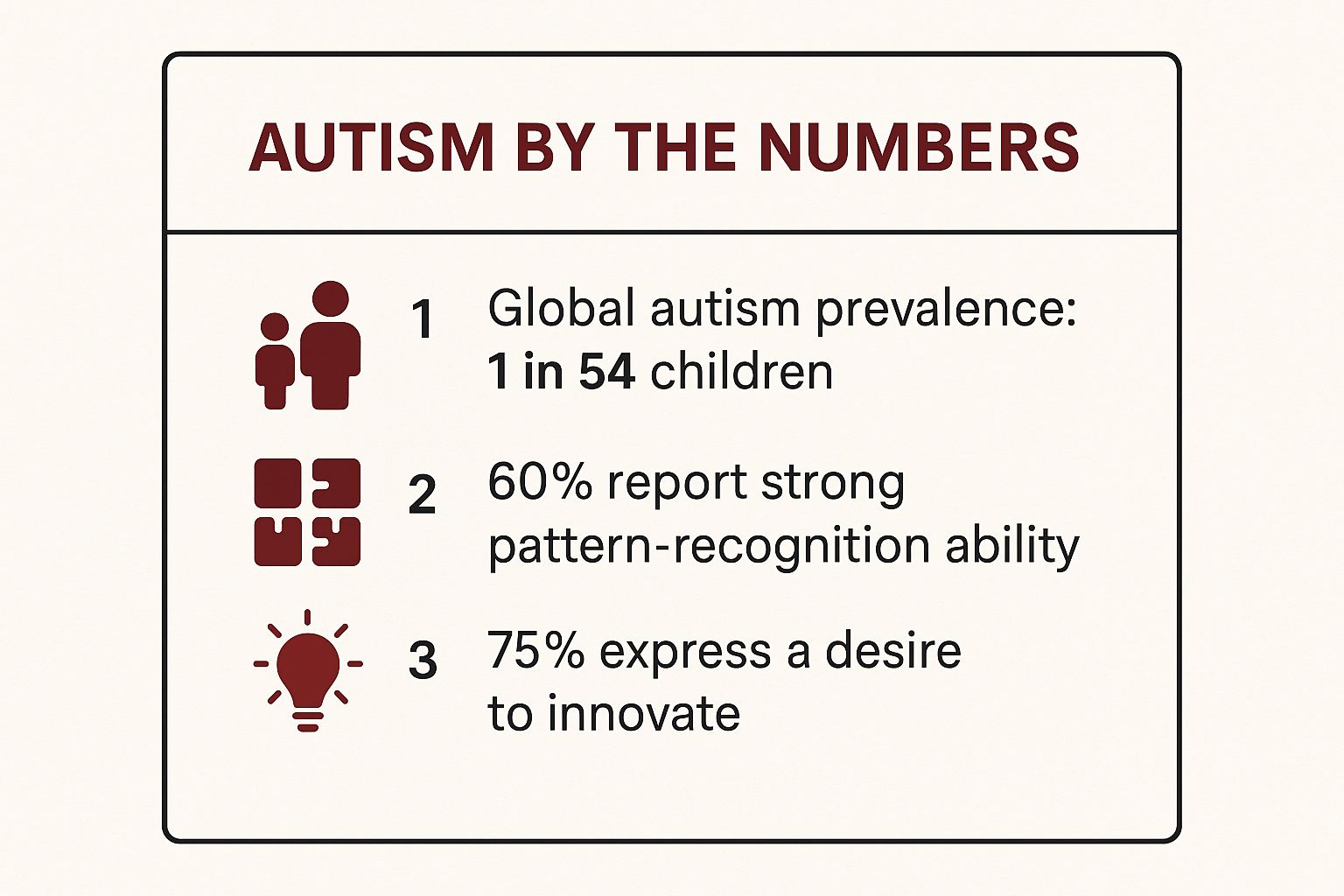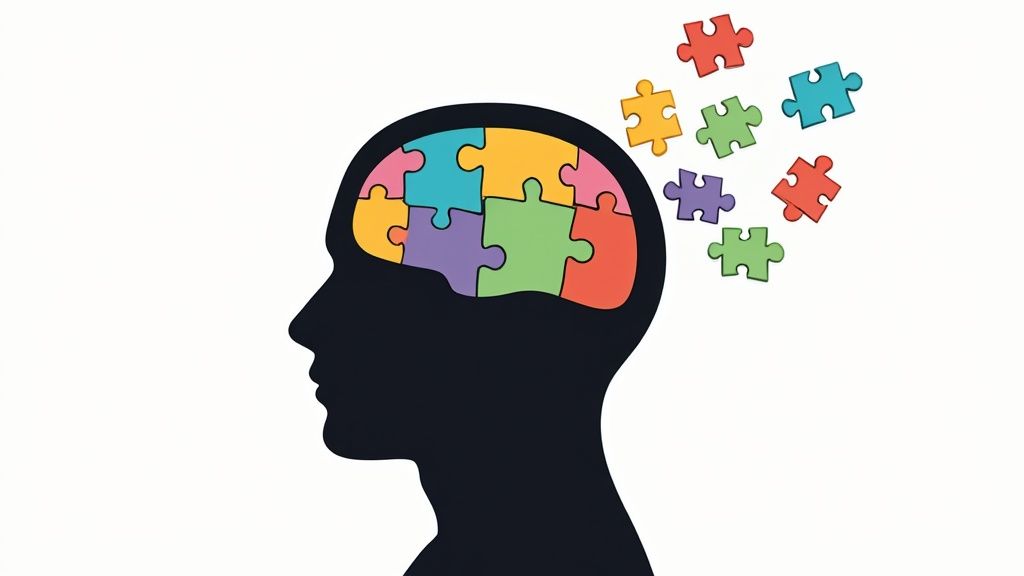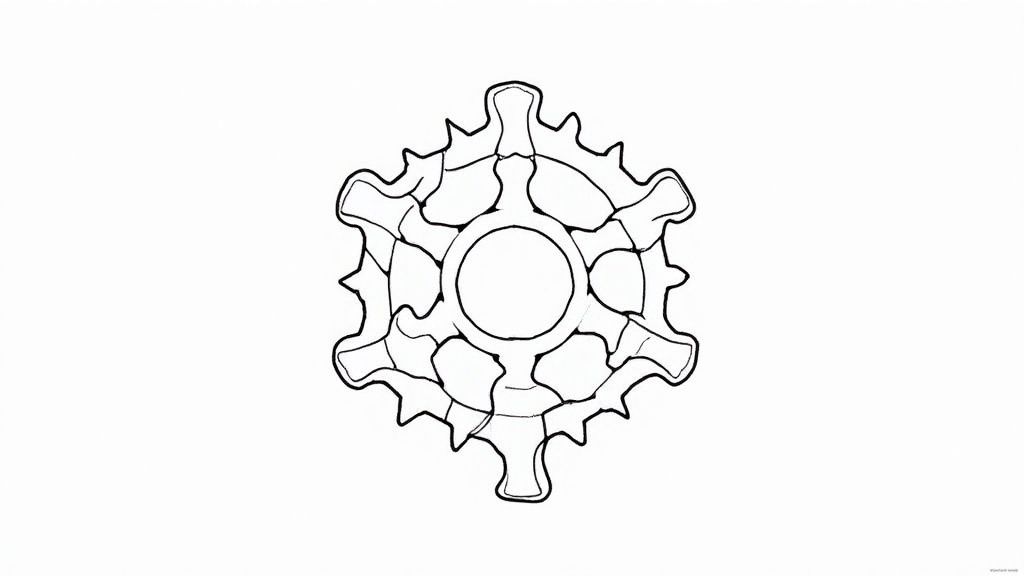The power of autism isn't just a positive spin—it's about recognizing a completely different, and often highly advanced, cognitive operating system. Instead of focusing on deficits, this perspective shines a light on incredible strengths like deep focus, superior pattern recognition, and methodical thinking. In our modern world, these aren't just quirks; they're superpowers.
Seeing Autism as a Strength, Not a Setback
For far too long, the conversation about autism has been stuck on its limitations. It's time to change that narrative.
Think of it this way: the neurotypical brain is like a versatile, all-purpose computer that’s pretty good at multitasking. The autistic brain, on the other hand, is more like a high-performance supercomputer. It’s built for specific, complex functions—deep analysis, finding order in chaos, and maintaining an unshakeable focus on a single goal. That is the true power of autism.
Why This Perspective Matters
Flipping the script from challenges to strengths isn't just about feeling good; it has a profound impact on real lives. When we nurture these innate talents, we unlock incredible potential.
- For Individuals: It’s a massive boost to self-esteem. It empowers autistic people to lean into their natural abilities at school, at work, and in their personal passions.
- For Families: This view provides a far more constructive way to offer support. The focus shifts from just managing difficulties to actively cultivating strengths. You can explore practical strategies for supporting children with autism that really emphasize this approach.
- For Society: Let's be honest, we need this. It brings fresh, invaluable perspectives to science, technology, art, and every other field, enriching our collective ability to solve problems.
A comprehensive meta-analysis covering over 21 million children found that autism spectrum disorder (ASD) affects approximately 0.77% of children globally. Recognizing that this significant portion of our population is a source of unique talent is not just important—it's essential for progress.
The infographic below really drives home the innovative potential humming within the autistic community.
These numbers tell a powerful story. The autistic community is not only wired for powerful pattern recognition but also has a deep-seated drive to innovate and create.
When we move beyond simple awareness and start to genuinely appreciate neurodiversity, we embrace the many different ways human minds can work and contribute.
Autistic Strengths at a Glance
To better understand this shift in perspective, it helps to reframe common autistic traits. What might be seen as a challenge from one angle is often a powerful advantage from another.
This table gives a quick summary of how we can look at these traits differently.
| Autistic Trait | Common Misconception | The Actual Superpower |
|---|---|---|
| Intense Focus on Niche Interests | "Obsessive" or "Limited" | Deep Expertise and unparalleled knowledge in specific fields. |
| Need for Routine and Predictability | "Inflexible" or "Rigid" | Reliability & Consistency, leading to high-quality, error-free work. |
| Direct Communication Style | "Blunt" or "Lacks Tact" | Honesty & Clarity, cutting through ambiguity to get to the point. |
| Sensory Sensitivity | "Overly Sensitive" | Attention to Detail, noticing subtle changes and patterns others miss. |
| Logical and Analytical Thinking | "Lacks Emotion" | Objective Problem-Solving, making decisions based on data, not bias. |
Seeing these traits as strengths helps everyone—from individuals and their families to employers and colleagues—understand the immense value autistic people bring to the table. This guide will dive deeper into these strengths, showing how they translate into tangible successes and why they are so vital for our future.
Unlocking the Cognitive Superpowers of the Autistic Mind
We've talked about reframing autism as a strength, but now let's dig into the specific cognitive advantages that truly define the power of autism. These aren't just abstract ideas; they are tangible, high-value skills that come from the unique wiring of the autistic brain. Think of them as specialized tools, each perfectly suited for complex tasks.
Far from being a drawback, the autistic mind often works with a level of precision and depth that can be a massive advantage. Let's break down three of the most impactful of these cognitive superpowers: hyperfocus, superior pattern recognition, and systematic thinking.
The Mental Spotlight of Hyperfocus
Imagine you're in a dark room with a flashlight. Most people might use a wide beam to light up a large area, but with less intensity. Hyperfocus is like switching that flashlight to a powerful, concentrated spotlight. It channels all mental energy onto a single subject, tuning out distractions with incredible efficiency.
This state of intense concentration allows for a deep dive into a topic, which can lead to an exceptional level of expertise. While a neurotypical person might get pulled away by notifications or background noise, someone in a state of hyperfocus can work for hours, completely absorbed and incredibly productive.
This isn't just about paying attention; it's about achieving a state of "flow" that many people strive for but few can consistently reach.
Hyperfocus allows the brain to process information on a much deeper level. It’s the engine behind mastery, turning casual interest into profound knowledge and skill.
This ability has direct, real-world applications. In fields like software development, scientific research, or the creative arts, being able to shut out the world to solve a complex problem is invaluable. It’s the difference between a surface-level understanding and a groundbreaking discovery.
Superior Pattern Recognition
The autistic brain is often described as a masterful pattern-detection machine. It excels at finding connections, sequences, and regularities that others might completely miss. This isn't just limited to visual patterns; it extends to data, systems, and even social interactions.
Think of it like having a built-in data analysis tool. Where most people see a jumble of information, the autistic mind can often spot the underlying structure, identify anomalies, and predict what might happen next. This skill is a cornerstone of logical and analytical reasoning.
Recent findings from Vanderbilt University Medical Center highlight this remarkable capability. Their research shows that autistic children often have enhanced perceptual abilities, excelling at identifying subtle visual details and processing multiple streams of information at once without the dip in performance seen in typically developing children. You can read more about these enhanced perceptual skills in their research.
This strength is a huge asset in many modern professions.
- Data Science: Identifying subtle trends in massive datasets.
- Cybersecurity: Detecting unusual activity that could signal a security breach.
- Financial Auditing: Spotting irregularities in complex financial records.
- Medical Diagnostics: Recognizing patterns of symptoms to identify rare conditions.
This natural ability to find order in chaos is a critical skill for making sense of our increasingly complex, data-driven world.
The Power of Systematic Thinking
Systematic thinking is the ability to understand and build complex systems. It involves breaking a large concept down into its individual parts, understanding how each piece works, and then seeing how they all fit together to create a coherent whole.
An autistic person might approach a problem by deconstructing it piece by piece, analyzing each element with methodical precision. This logical, step-by-step process ensures a thorough understanding and often leads to more robust and elegant solutions. It's like being an architect who doesn't just see a building but understands the role of every single brick, wire, and pipe.
This approach is fundamentally different from purely intuitive or "big picture" thinking. While both have their place, systematic thinking excels in fields that demand precision, accuracy, and logic.
Examples in Practice
- Engineering: Designing complex machinery where every component must work in perfect harmony.
- Computer Programming: Writing clean, efficient code by understanding the logical flow of the entire program.
- Legal Analysis: Constructing a sound legal argument by linking facts, precedents, and statutes in a logical sequence.
These three cognitive superpowers—hyperfocus, pattern recognition, and systematic thinking—are not just interesting traits. They are powerful tools that, when understood and nurtured, enable autistic individuals to excel in profound ways, driving innovation and offering unique solutions to some of our world's most challenging problems.
How Autistic Strengths Drive Workplace Success
The unique cognitive abilities of the autistic mind aren't just theoretical—they translate into real, high-value assets in the professional world. More and more companies are realizing that the power of autism isn't simply about social responsibility; it’s a serious competitive edge. By actively recruiting neurodivergent talent, these organizations are unlocking new levels of productivity and innovation.
Certain jobs and industries almost seem tailor-made for the autistic cognitive profile. Strengths like intense focus, meticulous attention to detail, and superior pattern recognition aren't just helpful—they're often the very things that define excellence in a role.
Industries Benefiting from Neurodiversity
Many sectors are discovering that autistic employees thrive in roles that neurotypical individuals might find tedious or overwhelming. The ability to maintain laser-like precision over long stretches is a true game-changer.
- Software Testing and Quality Assurance: An exceptional eye for spotting tiny errors, inconsistencies, or deviations from a pattern makes autistic individuals perfectly suited for finding bugs in complex code.
- Financial Auditing and Data Analysis: The logical, systematic thinking common in autism is ideal for combing through vast datasets to find irregularities, ensure compliance, and uncover financial trends others might easily miss.
- Scientific Research: The deep, unwavering focus required for methodical experiments and data interpretation allows autistic researchers to make incredible contributions, driving discovery forward with unmatched dedication.
This shift is about more than just accommodation; it's about seeing autism as a strategic advantage. Companies are now building entire programs dedicated to hiring and supporting this incredible talent pool.
"We created the Autism at Work program because we believe that we have a competitive advantage when our workforce is diverse and inclusive—and when we tap into the rich and broad talent of people on the spectrum."
– James Mahoney, Executive Director and Head of Autism at Work, JPMorgan Chase & Co.
And this isn't just a feel-good story; it’s a business strategy with stunning results. A landmark study from JPMorgan Chase revealed that employees in its Autism at Work program were 90% to 140% more productive than their neurotypical colleagues. Some autistic employees finished tasks in a few hours that typically took others days to complete, showcasing the incredible efficiency they bring to the table. You can find more details about these impressive workplace productivity findings.
Creating Environments for Success
Tapping into these strengths takes more than just a job offer. It requires creating an environment where autistic employees can genuinely thrive. True success isn’t just about bringing people in the door; it's about setting them up to win by understanding and meeting their needs. A supportive workplace is the key that unlocks their full potential.
To build this kind of inclusive and productive environment, companies should focus on a few core principles. These adjustments are often simple but can have a massive impact on an employee's well-being and output.
Key Environmental Accommodations:
- Clear Communication Protocols: Providing direct, unambiguous instructions—often in writing—cuts through confusion and lets employees focus on the task itself, not on interpreting social subtext.
- Sensory-Friendly Workspaces: Recognizing sensory sensitivities is crucial. Offering quiet zones, noise-canceling headphones, or control over lighting can dramatically reduce stress and boost concentration.
- Structured and Predictable Routines: A predictable workflow with clear expectations helps minimize anxiety, allowing autistic employees to channel all their energy into their work with confidence.
By putting these thoughtful changes in place, organizations create a setting where the unique talents of autistic individuals are not just accommodated but celebrated and amplified. For a deeper look, check out our guide on essential autism workplace accommodations. Building these supportive structures is how the theoretical power of autism becomes a practical reality, driving success for both the individual and the company.
Fueling Innovation with an Autistic Perspective
There's a persistent myth that autism means rigid, black-and-white thinking. But that stereotype completely misses a fundamental truth: the autistic perspective is an incredible engine for creativity and out-of-the-box problem-solving. After all, true innovation rarely comes from following the crowd. It comes from seeing the world through a different lens.
The real power of autism lies in this unique viewpoint. By processing information differently, autistic individuals often spot connections, patterns, and elegant solutions that neurotypical minds might just skim over. This isn't about a lack of creativity—it's about a different kind of creativity, one grounded in deep logic and a completely fresh perspective.
This distinct approach is what allows them to break down incredibly complex problems and rebuild them in novel ways. Instead of getting bogged down by conventional wisdom, they can tackle a challenge from an angle nobody else has even considered, leading to breakthroughs that defy expectations.
From Special Interests to Groundbreaking Expertise
One of the biggest drivers of this innovative streak is the phenomenon of intense, highly focused interests. These are far more than just hobbies; they are deep, immersive dives into specific subjects that cultivate an extraordinary level of expertise.
According to the National Institute of Neurological Disorders and Stroke (NINDS), these focused interests allow autistic people to develop exceptional skills in their chosen fields. This deep-dive style of learning is a major cognitive strength, fueling mastery in everything from science and tech to the arts. You can learn more about these cognitive strengths and focused interests.
This intense dedication is what turns passion into world-class expertise. Think of a young person fascinated by ancient history who doesn't just read about it but memorizes entire timelines, learns dead languages, and identifies subtle patterns in historical artifacts. That depth of knowledge is the bedrock of future discovery.
Trailblazers Who Think Differently
History is full of innovators who were believed to be on the autism spectrum. Their stories are a testament to how a different way of thinking can genuinely change the world.
- Nikola Tesla: The visionary inventor’s intense focus and unique visualization abilities let him design complex electrical systems entirely in his mind before ever building them. His unconventional methods led directly to the alternating current (AC) system that powers our world today.
- Satoshi Tajiri: The creator of Pokémon was driven by his childhood passion for collecting insects. He transformed this systematic interest into one of the most successful entertainment franchises in history—a world built on intricate rules, patterns, and classifications.
- Temple Grandin: A world-renowned animal science professor and autism advocate, Dr. Grandin used her ability to "think in pictures" to revolutionize the livestock industry. She designed more humane systems by visualizing the world from an animal's perspective, a viewpoint others had completely missed.
These examples all point to the same thing: innovation isn't just about having a new idea. It’s about having a unique perspective that lets you see the problem in a way no one else has before.
Innovation often stems not from what you think, but how you think. The autistic mind offers a fundamentally different operating system for creativity, one that can bypass conventional roadblocks to find elegant and original solutions.
The Intersection of Logic and Imagination
The creative process in the autistic mind often blends deep, systematic logic with a vibrant inner world of imagination. This combination can lead to incredibly detailed and complex creations, whether in art, music, or science. For a detailed look at this dynamic, you can explore our article on autism and imagination.
This unique cognitive style enables individuals to build entire worlds in their minds, complete with their own rules, histories, and systems. In science, it might manifest as a groundbreaking theory that connects previously unrelated concepts. In art, it could be a masterpiece with layers of intricate detail and symbolic meaning.
Ultimately, the autistic perspective is a vital source of human creativity. By challenging outdated stereotypes and embracing this different way of thinking, we unlock a wellspring of innovation that benefits everyone. The world needs more problem-solvers who aren't afraid to defy conventional wisdom and build something new from the ground up.
Creating Environments Where Autistic Strengths Flourish
Knowing about the cognitive superpowers of the autistic mind is one thing, but actually creating the right conditions for them to shine is where the real magic happens. To truly unlock the power of autism, we need to move away from trying to "fix" deficits and focus instead on nurturing strengths. This means building environments—at home, school, and work—that adapt to the person, rather than forcing the person to fit into a neurotypical mold.
This isn't a passive process; it takes intention and empathy. It’s all about creating a world where autistic individuals feel safe, understood, and confident enough to use their natural abilities. With a few thoughtful adjustments, we can turn potentially stressful places into spaces where they can grow and succeed.
Building a Foundation of Support at Home
The home should be a sanctuary—a predictable and supportive space where an autistic person can recharge and just be themselves. Creating this kind of environment often means honoring the very traits that define their cognitive style. For parents and family, this means becoming a student of your loved one's unique needs and strengths.
A huge piece of this is respecting the need for routine. Predictability isn't about being rigid; it's about reducing the mental effort needed to get through the day. When the daily structure is clear, more mental energy can go toward learning, creating, and connecting. This builds a stable foundation from which they can confidently explore the world. For more detailed guidance, check out our practical tips for creating your autism-friendly home.
Creating a supportive environment is not about lowering expectations. It’s about providing the right tools and structure so that an autistic individual can meet and exceed those expectations on their own terms.
Strategies for the Classroom and Workplace
These same principles are just as important in school and at work, where small accommodations can lead to huge wins. The goal is to design systems that play to autistic strengths instead of accidentally highlighting their challenges.
With about 1 in 31 children in the United States diagnosed with ASD, these strategies are more critical than ever. As you can see from these autism facts and figures on motivity.net, prevalence rates vary across different racial and ethnic groups, which underscores just how important widespread, inclusive support really is.
Here are a few practical strategies that can make a world of difference:
- Provide Sensory Accommodations: Offer noise-canceling headphones, adjustable lighting, or a quiet space to retreat. This simple act acknowledges sensory sensitivities and helps minimize overwhelming input so they can focus.
- Use Clear and Direct Communication: Avoid sarcasm, idioms, and vague instructions. Clear, literal, and often written directions make sure expectations are understood without anyone having to decode social subtext.
- Embrace Special Interests: Don't see deep interests as obsessions. Instead, view them as powerful gateways to learning and engagement. Weaving these topics into lessons or projects can fuel motivation and tap into a deep well of existing knowledge.
By putting these kinds of strength-based supports in place, we move beyond simple tolerance and into genuine appreciation. We start building ecosystems where the unique wiring of the autistic brain isn't just accepted—it's seen as a valuable asset, ready to contribute in profound and meaningful ways.
Why a Neurodiverse Future Is a Better Future
We've spent this time exploring the incredible cognitive strengths that truly define the power of autism. From the laser-like intensity of hyperfocus to the uncanny ability to spot patterns others completely miss, these aren’t just quirks. They are vital tools for human progress, perfectly suited for untangling the complex problems of our modern world.
When we start to see autism through this lens, everything changes. The conversation shifts from managing deficits to actively nurturing incredible talents. Think about it—in our workplaces, classrooms, and communities, this perspective unlocks a deep well of innovation, precision, and creativity that we've been ignoring for far too long. A neurodiverse world isn’t just about being more inclusive; it's about being more capable and a whole lot smarter.
From Awareness to Active Appreciation
Frankly, simple awareness just doesn't cut it anymore. The real work begins when we move toward active appreciation—a genuine recognition of the value that different ways of thinking bring to the table. This means building environments where autistic individuals aren't just tolerated, but are celebrated and empowered to use their unique skills without feeling like they have to hide who they are.
This shift isn't passive; it requires intentional action from all of us.
- Educators can build learning models around a student's deep interests, turning passions into strengths.
- Employers can redesign their hiring processes and create workspaces that are genuinely supportive.
- Allies can make a conscious effort to listen, amplify autistic voices, and push back against outdated stereotypes.
This is how we build a future where every type of mind is valued for what it can contribute. It’s about creating systems that adapt to people, not forcing people to contort themselves to fit into broken systems.
A neurodiverse future is one where the collective intelligence of humanity is expanded, not limited. By embracing the full spectrum of human cognition, we equip ourselves with a richer, more versatile toolkit for building a better world.
A Call to Champion Neurodiversity
The path forward is clear. We have to champion the power of autism not as some niche topic, but as a critical piece of our shared success. This means fighting for real inclusion, celebrating different perspectives, and making sure every single person has the support they need to let their strengths shine.
Let this be more than just a nice idea. Make it a personal and collective promise to see, support, and elevate the autistic people in your life and in your community. When we do this, we don't just create a better future for them—we build a more innovative, compassionate, and brilliant future for absolutely everyone.
Frequently Asked Questions About Autism Strengths
As the conversation around neurodiversity gets louder and more nuanced, a lot of questions come up. Many people are trying to shift their perspective away from the old deficit-based models and toward a more strength-focused view of autism. It means letting go of a few myths.
This section gets right to it, tackling some of the most common questions we hear about the unique abilities tied to being autistic. Our goal is to give you clear, straight-up answers that drive home the main point: different ways of thinking are not just okay, they're incredibly valuable.
Does Every Autistic Person Have a Special Talent or Superpower?
This is a classic trope we see in movies, but the reality is much more subtle. When we talk about the power of autism, we’re usually referring to a common profile of cognitive strengths—things like intense focus, logical reasoning, and a real knack for spotting patterns. It’s not a guarantee that every person will have a savant-level skill.
These strengths show up differently in everyone. Just like neurotypical people, every autistic individual has their own unique mix of talents and challenges. The important thing is to recognize and support their natural aptitudes instead of only zeroing in on their difficulties.
Think of it less like a single "superpower" and more like a specialized cognitive toolkit. The key is understanding which tools an individual has and helping them learn how to use them effectively.
How Can I Best Support an Autistic Person's Strengths?
Real support starts with acceptance and a genuine curiosity to understand their world. One of the best things you can do is to encourage their deep interests. These passions are often the most direct path to developing incredible skills and finding a true sense of fulfillment.
Beyond that, creating an environment where they can thrive involves a few key things that can make a world of difference.
- Use Clear Communication: Be direct and literal. This cuts down on the mental energy they have to spend decoding social subtext, letting them focus on what you're actually saying.
- Create a Predictable Environment: Structure and routine aren't about being rigid; they're about reducing anxiety. This frees up their brainpower for learning, creating, and solving problems.
- Advocate for Accommodations: Whether at school or work, help them get what they need to succeed. This could be as simple as asking for written instructions or a quiet desk to allow for that deep, uninterrupted focus.
At its core, it's about acknowledging and celebrating their unique way of seeing and contributing to the world.
Are Companies Actively Hiring Autistic People for Their Skills?
Absolutely, and it’s a trend that’s picking up speed. More and more businesses are realizing the massive competitive advantage neurodivergent talent brings to the table. Big names like Microsoft, SAP, and JPMorgan Chase have even launched dedicated "Autism at Work" programs to recruit and support these individuals.
These companies get it. They understand that the skills often found in the autistic community—like an incredible attention to detail, precision, and objective analysis—are pure gold. This is especially true in fields like tech, finance, and quality assurance. These programs are solid proof that inclusive hiring isn't just a feel-good ethical choice; it's a brilliant business move that boosts innovation and productivity.
At Sachs Center, we specialize in providing diagnostic clarity for children, teens, and adults. Our telehealth-based assessments for ADHD, Autism, and AuDHD are designed to help you understand your unique strengths and challenges. If you're ready for answers, book a virtual evaluation with our expert psychologists today.




